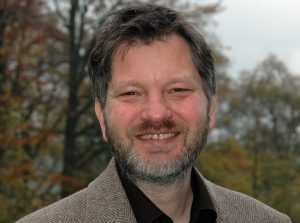Prof. Dr. Tilmann Gneiting

Gruppenleiter Computational Statistics (CST) am HITS
Professor für Computational Statistics, Institut für Stochastik am Karlsruher Institut für Technologie (KIT)
Forschungsinteressen
Statistik und Wahrscheinlichkeitstheorie; räumliche und räumlich-zeitliche Modellierung; Theorie und Anwendung von Vorhersagen in Meteorologie, Umwelt- und Erdwissenschaften, Wirtschaft und Finanzen, etc.
Curriculum Vitae
seit 2013 Gruppenleiter Computational Statistics (CST), Heidelberger Institut für Theoretische Studien
seit 2013 Professor für Computational Statistics, Institut für Stochastik, Karlsruher Institut für Technologie
seit 2010 Affiliate Professor für Statistik, University of Washington, Seattle, USA
2009-2013 Professor für Mathematische Statistik, Universität Heidelberg
2007-2009 Professor für Statistik, University of Washington, Seattle, USA
2003-2007 Associate Professor für Statistik, University of Washington, Seattle, USA
1998-2003 Assistant Professor für Statistik, University of Washington, Seattle, USA
1997-1998 Acting Assistant Professor für Statistik, University of Washington, Seattle, USA
1997 Promotion in Mathematik an der Universität Bayreuth
1993 Diplom in Mathematik an der Universität Bayreuth
1992 M.A. in Mathematik an der Boston University, USA
Redakteurs-Aktivitäten
2016-2018 Editor-In-Chief, Annals of Applied Statistics
2014-2015 Senior Editor, Annals of Applied Statistics
2013-2014 Guest Editor, Nonlinear Processes in Geophysics
2011-2014 Editor for Physical Science, Computation, Engineering and the Environment, Annals of Applied Statistics
2010 Associate Editor, Annals of Statistics
2009-2010 Associate Editor, Environmetrics
2009-2010 Associate Editor, Weather and Forecasting
2008-2010 Associate Editor, Annals of Applied Statistics
2006-2009 Associate Editor, Journal of the Royal Statistical Society Series B: Statistical Methodology
Auszeichnungen
2014-2020 Fellow, European Centre for Medium-Range Weather Forecasts (ECMWF)
2012-2018 Advanced Grant, European Research Council (ERC)
2017 Highly Cited Researcher in Mathematik für den Zeitraum von 2005-2015, Clarivate Analytics
2017 Fellow, American Statistical Association
2016 Highly Cited Researcher in Mathematik für den Zeitraum von 2004-2014, Clarivate Analytics (vormals Thomson Reuters)
2015 Read Paper (gemeinsam mit Werner Ehm, Alexander Jordan und Fabian Krüger), Royal Statistical Society, London (UK), 9. Dezember 2015
2015 Highly Cited Researcher in Mathematik für den Zeitraum von 2003-2013, Thomson Reuters
2015 Distinguished Achievement Medal, American Statistical Association Section on Statistics and the Environment
2014 Highly Cited Researcher in Mathematik für den Zeitraum von 2002-2012, Thomson Reuters
2011 Outstanding Paper Award, International Institute of Forecasters
2010 Fellow, Institute of Mathematical Statistics
2005 Richard L. Tweedie New Researcher Award, Institute of Mathematical Statistics
2002 Early Career Award, National Science Foundation, US
1991-1992 Fulbright Scholarship
Publikationen
Hier geht es zu meinem Google Scholar Profil
About HITS
HITS, the Heidelberg Institute for Theoretical Studies, was established in 2010 by physicist and SAP co-founder Klaus Tschira (1940-2015) and the Klaus Tschira Foundation as a private, non-profit research institute. HITS conducts basic research in the natural, mathematical, and computer sciences. Major research directions include complex simulations across scales, making sense of data, and enabling science via computational research. Application areas range from molecular biology to astrophysics. An essential characteristic of the Institute is interdisciplinarity, implemented in numerous cross-group and cross-disciplinary projects. The base funding of HITS is provided by the Klaus Tschira Foundation.